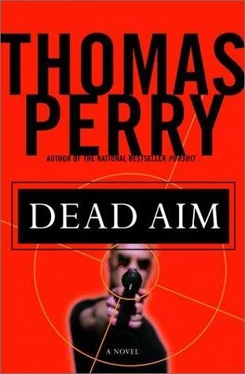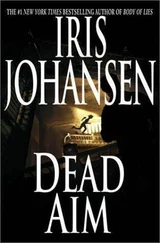Thomas Perry - Dead Aim
Здесь есть возможность читать онлайн «Thomas Perry - Dead Aim» весь текст электронной книги совершенно бесплатно (целиком полную версию без сокращений). В некоторых случаях можно слушать аудио, скачать через торрент в формате fb2 и присутствует краткое содержание. Жанр: Триллер, на английском языке. Описание произведения, (предисловие) а так же отзывы посетителей доступны на портале библиотеки ЛибКат.
- Название:Dead Aim
- Автор:
- Жанр:
- Год:неизвестен
- ISBN:нет данных
- Рейтинг книги:4 / 5. Голосов: 1
-
Избранное:Добавить в избранное
- Отзывы:
-
Ваша оценка:
- 80
- 1
- 2
- 3
- 4
- 5
Dead Aim: краткое содержание, описание и аннотация
Предлагаем к чтению аннотацию, описание, краткое содержание или предисловие (зависит от того, что написал сам автор книги «Dead Aim»). Если вы не нашли необходимую информацию о книге — напишите в комментариях, мы постараемся отыскать её.
Dead Aim — читать онлайн бесплатно полную книгу (весь текст) целиком
Ниже представлен текст книги, разбитый по страницам. Система сохранения места последней прочитанной страницы, позволяет с удобством читать онлайн бесплатно книгу «Dead Aim», без необходимости каждый раз заново искать на чём Вы остановились. Поставьте закладку, и сможете в любой момент перейти на страницу, на которой закончили чтение.
Интервал:
Закладка:
He followed Fowler into the hallway, and then through a door near the end of the hall. There was clearly something about the death of the girl that had not been in the papers. He chided himself for rediscovering the obvious. How could he have imagined that there would not be?
When Mallon left the police department he drove home, then admitted to himself that the only sensible thing he could do was to see his lawyer, Diane Fleming, to tell her what had happened. He turned on his front steps to go back toward his car, but then changed his mind, left it in the driveway, and instead walked down Anacapa Street toward her office. He had been sitting in the police station for hours, and he told himself he needed to walk and arrange his thoughts before he spoke with her. But after a block, he found that there was an unexpected aftereffect of failing to persuade the girl not to kill herself: it was forcing him to revisit parts of his own life.
Mallon knew much more about what might happen to him than he had told Fowler. The slow, methodical procedures of the police and the courts were very familiar to him. When he was eighteen, he had disappointed his parents and gone into the Air Force instead of going to college. After he had gotten out, he had returned to the still half-rural area outside San Jose where his family had lived since the gold rush, and disappointed his parents again by going to the police academy to become a parole officer. He had worked in the San Jose department for four years before he’d reluctantly conceded to himself that his optimistic longing to take people who had made mistakes and repair their lives had not made him good at it. All his sincerity and hard work had accomplished was to make him feel like a failure, case by case. He’d felt that he was smothering himself in problems that he could not hope to solve. He’d handed in his badge and a short letter of resignation and had gone to work as a carpenter on a construction crew.
After a year of construction work and some intensive study, he had gotten a contractor’s license and hired his own crews and begun to build houses. On his father’s advice, since he had joined the Air Force he had been putting all of his savings into buying pieces of farmland. He had simply held it, paying the bank and the taxes by renting it to neighboring farmers who wanted more land to cultivate.
After his construction business had begun to prosper, he met a girl named Andrea at a party, took her out a few times, fell in love, and persuaded her to marry him. It was only two years later that his parents both died-first his father, and then a few months after that, his mother. He was terribly sad, but not particularly surprised. In a way, he had been expecting it, and when it came, it seemed almost overdue. It seemed to him that they had begun to die on the day when the call from Boston had come about his older sister, Nancy.
Nancy had been the smart one, the only one who’d ever played the piano that sat in the parlor of the family farmhouse, a beautiful, tall, strong girl with an open-mouthed, loud laugh and long, light brown hair that the sun always bleached a bit in the summer. She had gone off to college in Boston when he was twelve and, according to his parents, had done beautifully for the first three years. She was still doing just as well on the day when she had made her telephone call.
The day became such a part of his history that he had never seen another month of March arrive since then without remembering. He had answered the telephone and been surprised, because long-distance calls were expensive, and scholarships didn’t pay for them. He remembered being a bit confused, because she seldom called, and this conversation didn’t seem to be about anything much. She had seemed disappointed when he’d told her that both of their parents were out, but she had filled the time by asking him what he’d been doing, how his grades were, and had even teased him a bit about girls. She had seemed reluctant to hang up, as though she were hoping their parents would arrive. He had offered to have them call her back later, but she had said, “No, never mind. I don’t think I’ll be around then. Just tell them I love them. I love you all.” Then they’d hung up. The next call from Boston had been from the head of the campus police. It had fallen to him to tell the family that she’d killed herself.
It had been the most important day in the life of Mallon’s family, the day when everything had changed. His parents had been different after that, in a slow decline that lasted until he was a married, self-employed, and successful contractor. And when that had been accomplished, they’d died.
Mallon went on, remodeled the old family house and moved his wife into it, and kept building his business. In time, the monetary value of the land he had bought became so compelling that he needed to devote some attention to finding something to do with it. His wife, Andrea, had always been ashamed that he was essentially a tradesman who worked with his crew and came home in blue jeans soaked in sweat and covered with sawdust. She had, since their wedding day, referred to her husband as a “developer,” but had lately refined her story to promote him to a man who “owned land,” and so she welcomed any sign that he was actually interested in the property, and not in getting his hands dirty.
He began to build houses on the farmland. He was one of the many beneficiaries of the steady population growth of northern California, and soon he began to act very much like the man Andrea had been saying he was. Then, ten years ago, as their growing prosperity was becoming noticeable, she had decided that it was time to leave.
Mallon’s divorce from Andrea had been an ugly, drawn-out campaign with charges and counterattacks that had been painful but meant nothing, since it made no legal difference in the state of California if he was taciturn and distant or if she’d had affairs. Once they were no longer living together, the battles finally had nothing to focus on but the sums that could be produced by the sale of things that had once been treasures. Their meeting on the day of the final decree had ended the marriage in a last conflagration and a division of spoils.
The property division had required that they sell their house. It had been in his family for four generations, and had originally been a working farm. Even when he had been a boy, it still had been far enough out in the country so that he and his father used to take target practice with their rifles at the edge of their backyard. In that direction there had been nothing to hit for miles. Since then, the city of San Jose had simply grown to engulf the farm and make the hundred acres worth more than all the crops ever grown there. He had felt a deep guilt for not contriving a way to prevent the sale of the house. He had not, in any emotional sense, owned it. He had not been one of the people who had built it, or fought the droughts and the politicians to hold it. He had merely covered over a few more of the fields with grass to enlarge the yard, turned his grandmother’s kitchen garden into a tennis court, torn out his father’s swimming pool and put in a better one to please Andrea. He had, by default, been this generation’s caretaker, holding the house for the next. When it went, he had mourned it like a death, but the house had not been a surprise. She had not liked the place.
The sale of the construction business Mallon owned had been a surprise, because he had never before seen Andrea make a decision that seemed contrary to her own best interests. He had offered her a monthly income that would have consisted of half his profits. But she had insisted on having the company appraised-trucks, tools, trailers, telephones-and getting half of the total in cash immediately.
Andrea’s demand came just at a time when northern California was gripped in its most frantic growth spurt. Mallon had run out of land that he had already paid for or inherited, and had begun borrowing to buy more empty land and build developments on it. He had needed to use all his credit, so when her demand came, all Mallon had been able to do was agree to sell out and give her what she had asked for. But her timing was perfect. A much larger company made a preemptive offer just so they could keep the buildings going up without a pause. None of his crews even got a day off when the exchange was made. Mallon had told his lawyers to handle the sale, pay off the debts, give Andrea’s attorneys a check for her half of what was left, and send his share to Wells Fargo bank.
Читать дальшеИнтервал:
Закладка:
Похожие книги на «Dead Aim»
Представляем Вашему вниманию похожие книги на «Dead Aim» списком для выбора. Мы отобрали схожую по названию и смыслу литературу в надежде предоставить читателям больше вариантов отыскать новые, интересные, ещё непрочитанные произведения.
Обсуждение, отзывы о книге «Dead Aim» и просто собственные мнения читателей. Оставьте ваши комментарии, напишите, что Вы думаете о произведении, его смысле или главных героях. Укажите что конкретно понравилось, а что нет, и почему Вы так считаете.












